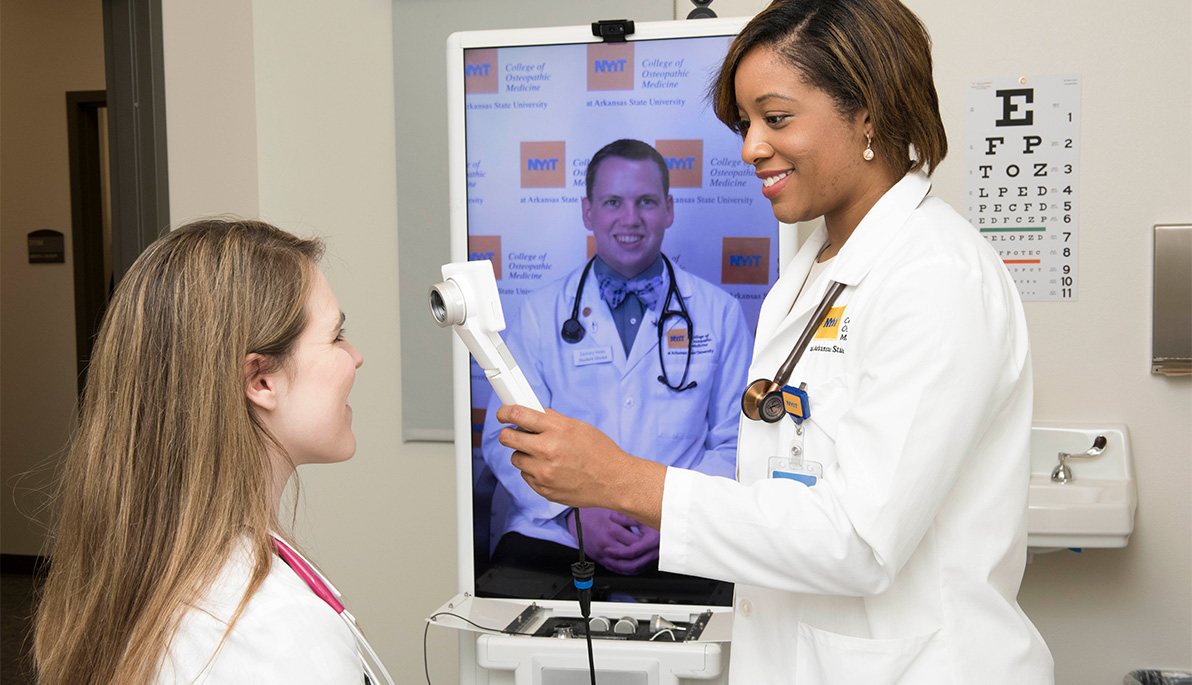
Telemedicine in Uncertain Times
March 31, 2020
Increased testing is a necessary step in containing, addressing, and overcoming the coronavirus pandemic. As COVID-19 cases are revealed, an increasing number of healthcare providers, including those at New York Institute of Technology, are turning to telemedicine as a powerful tool to provide care while also safely distancing themselves and slowing the spread.
Telemedicine, also referred to as telehealth, is broadly defined as the virtual care that allows healthcare professionals and their patients to meet remotely by phone or video chat. These solutions seem tailor-made to today’s circumstances. While the virus has spurred a great deal of uncertainty, Darren Sommer, D.O., assistant professor of clinical medicine at NYIT College of Osteopathic Medicine says one thing’s for sure: telemedicine will be play a critical role in combatting COVID-19.
“Nationally, we have a supply and demand mismatch. There is no way to get enough physicians physically to one area of the country, so we have to use technology to bridge the gap,” says Sommer, who also teaches telemedicine to medical students at NYITCOM-Arkansas and innovated his own telehealth solution known as The Rounder.
The physicians and healthcare professionals at New York Tech’s Academic Health Centers (AHCC) on Long Island agree. As patients navigate the challenges of COVID-19, the Centers continue to provide a steady source of comfort and care to patients. Physicians and staff remain available via telemedicine services to answer questions and assist New York Tech community members who are not feeling well.
“Telemedicine allows us to evaluate and assess our patients while limiting their risk of exposure to COVID-19,” said Hallie Zwibel, D.O., AHCC medical director. “We can now see patients from the comfort of their home. All someone needs to do a telemedicine appointment is a smartphone or a computer with a web camera and microphone.”
Zwibel adds that while telemedicine is a great way to connect provider and patient, it’s still a good idea to call first and find out if symptoms are appropriate for a telemedicine visit, as the technology may not be appropriate for all conditions. While it is possible to asses a rash or sore throat a physician may have difficulty auscultating the heart and lungs or check for reflexes.
Bernadette Riley, D.O., director of the Ehlers-Danlos Syndrome/Hypermobility Treatment Center, echoes this point.
“My patients have been in contact with me throughout the pandemic, via the phone, web portals and in person, if needed. Although our clinic is still open and I am seeing patients, it is important that a patient discuss their symptoms with their primary care provider and staff before coming in,” she says.
Patients with EDS or hypermobility conditions are at a greater risk for complications from COVID-19. These conditions often cause cardiac complaints, such as syncope (fainting), palpitations, and tachycardia, which can worsen during stressful circumstances. To address these issues, Todd Cohen, M.D., chief of cardiology and director of medical device innovation at NYITCOM, investigated and deployed a cloud-based method to provide HIPAA-compliant telehealth services to the Center’s patients. The availability of the services has been helpful in reducing anxiety during the COVID-19 outbreak.
The CDC reminds Americans that coping with stress will make individuals and their communities stronger. Connecting with a trusted mental healthcare professional can improve well-being during the outbreak. In light of the current situation, New York Tech is also providing resources to assist community members who are experiencing anxiety or difficulty with coping. The university’s Counseling and Wellness Services are now offered via Zoom calls and video chat. New York Tech students, faculty, and staff can contact a counselor via email to set up a video chat, and may also sign up for group counseling services on the department’s website.
“With this outbreak we’re also focusing on the emotional and psychological well-being of our community. Luckily, telehealth is a great option to communicate with counseling and wellness and our psychologists and psychiatrist,” says Zwibel.
The rise in telehealth services, including those for mental health counseling, began years before COVID-19 came onto the scene. Remote counseling services were mainstream and widely available with the explosion of apps like Talkspace, and other healthcare providers were starting to incorporate telehealth into their everyday practices. A 2018 survey by American Well found that physician adoption of telehealth shot up from 5 percent to 22 percent between 2015 and 2018. The medical education field also began adopting the technology in an effort to prepare future physicians for the evolving workforce. Medical schools, including NYITCOM, have incorporated telehealth into their curricula and community outreach services, like the NYITCOM-Arkansas Delta-Care-a-van.
While the trend has steadily begun to change the healthcare landscape, the urgency of COVID-19 may force even the most reluctant physicians to become more adaptable, especially in rural areas where access to healthcare is already strained. Sommer believes that providers who previously doubted telemedicine’s tremendous potential are now coming around, and will continue to rely on the technology long after the outbreak has subsided.
“Telemedicine is here to stay, and it’s amazing how it went from snake oil to the Holy Grail almost overnight,” said Sommer. “There will be some dialing back of it, but not like what it was just two or three weeks ago.”

By Casey Pearce
More Features

An Alumnus’ Commitment to the Environment
As an energy management graduate from New York Tech’s Vancouver campus, Jasdeep Gulati (M.S. ’22) is highly invested in educating people about environmental and climate sustainability.

Vancouver Faculty Win University-Sponsored Research Awards in New Program
The new Global Impact Research Grant (GIRG) program has been developed to keep Vancouver-based faculty connected to faculty and research projects being conducted on the university’s New York campuses.

Studying Climate Change One Degree at a Time
Junhua Qu (M.S. ’24) began her collegiate journey in Beijing. But, her interest in climate change took her to New York Tech’s Vancouver campus to study energy management.
